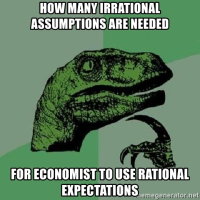The rational expectations putsch The tiny little problem that there is no hard empirical evidence that verifies rational expectations models doesn’t usually bother its protagonists too much. Rational expectations überpriest Thomas Sargent has defended the epistemological status of the rational expectations hypothesis arguing that since it “focuses on outcomes and does not pretend to have behavioral content,” it has proved to be “a powerful tool for making precise statements.” Precise, yes, but relevant and realistic? I’ll be dipped! In their attempted rescue operations, rational expectationists try to give the picture that only heterodox economists like yours truly are critical of the rational expectations hypothesis. But, on this, they are, simply … eh
Topics:
Lars Pålsson Syll considers the following as important: Economics
This could be interesting, too:
Lars Pålsson Syll writes Schuldenbremse bye bye
Lars Pålsson Syll writes What’s wrong with economics — a primer
Lars Pålsson Syll writes Krigskeynesianismens återkomst
Lars Pålsson Syll writes Finding Eigenvalues and Eigenvectors (student stuff)
The rational expectations putsch
The tiny little problem that there is no hard empirical evidence that verifies rational expectations models doesn’t usually bother its protagonists too much.  Rational expectations überpriest Thomas Sargent has defended the epistemological status of the rational expectations hypothesis arguing that since it “focuses on outcomes and does not pretend to have behavioral content,” it has proved to be “a powerful tool for making precise statements.”
Rational expectations überpriest Thomas Sargent has defended the epistemological status of the rational expectations hypothesis arguing that since it “focuses on outcomes and does not pretend to have behavioral content,” it has proved to be “a powerful tool for making precise statements.”
Precise, yes, but relevant and realistic? I’ll be dipped!
In their attempted rescue operations, rational expectationists try to give the picture that only heterodox economists like yours truly are critical of the rational expectations hypothesis.
But, on this, they are, simply … eh … wrong.
Let’s listen to Nobel laureate Edmund Phelps — hardly a heterodox economist — and what he has to say (emphasis added):
Q: So how did adaptive expectations morph into rational expectations?
A: The “scientists” from Chicago and MIT came along … They said, let’s be scientific. In their mind, the scientific way is to suppose price and wage setters form their expectations with every bit as much understanding of markets as the expert economist seeking to model, or predict, their behavior …
Q: And what’s the consequence of this putsch?
A: Craziness for one thing … What led to rational expectations was a fear of the uncertainty and, worse, the lack of understanding of how modern economies work. The rational expectationists wanted to bottle all that up and replace it with deterministic models of prices, wages, even share prices, so that the math looked like the math in rocket science … The problem is that we don’t have a “right” model that could be certified as such by the National Academy of Sciences. And as long as we operate in a modern economy, there can never be such a model.
The rational expectations hypothesis presumes consistent behaviour, where expectations do not display any persistent errors. In the world of rational expectations, we are always, on average, hitting the bull’s eye. In the more realistic, open systems view, there is always the possibility (danger) of making mistakes that may turn out to be systematic. It is because of this, presumably, that we put so much emphasis on learning in our modern knowledge societies.
So, where does all this leave us? I think John Kay sums it up pretty well:
An important scientific advance yields conclusions that differ from those derived from other theories, and establishes that these divergent conclusions are supported by observation. Yet as Prof Sargent disarmingly observed, “such empirical tests were rejecting too many good models” in the programme he had established with fellow Nobel laureates Bob Lucas and Ed Prescott. In their world, the validity of a theory is demonstrated if, after the event, and often with torturing of data and ad hoc adjustments that are usually called “imperfections”, it can be reconciled with already known facts – “calibrated”. Since almost everything can be “explained” in this way, the theory is indeed universal; no other approach is necessary, or even admissible …
